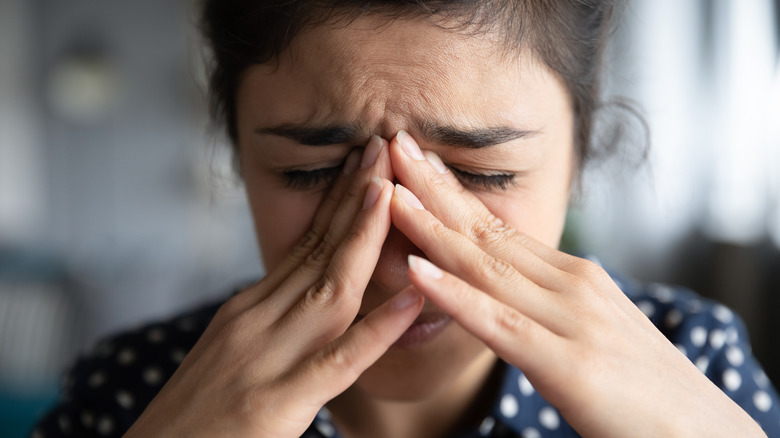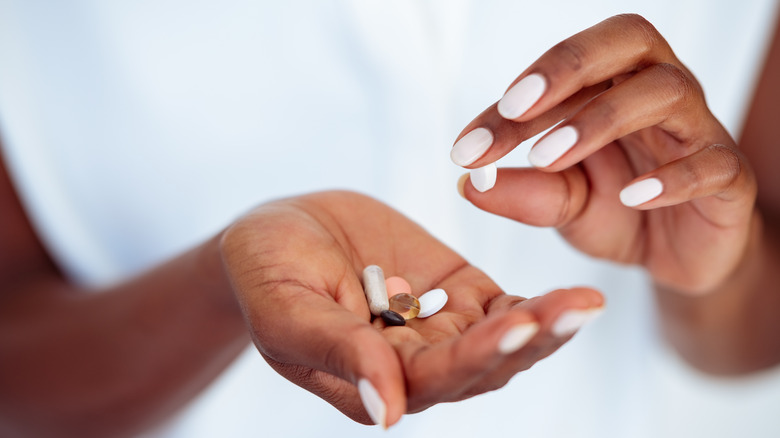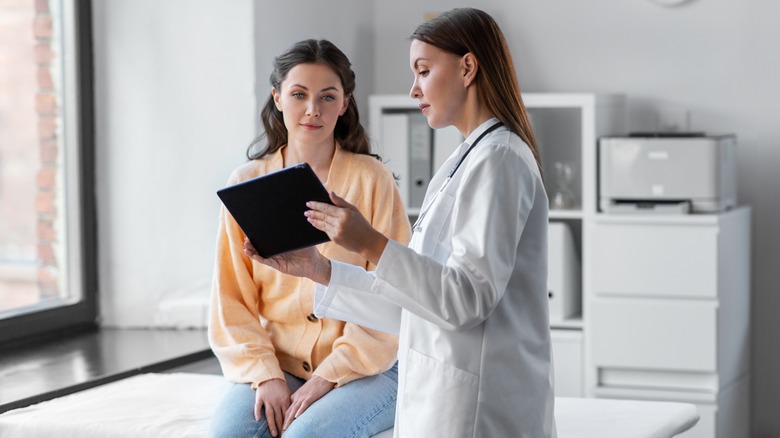What Is Post-Menstrual Syndrome?
The phrase "that time of the month" is usually said with a groan, thanks to the long list of uncomfortable symptoms that can accompany periods. Many of the most notable symptoms occur during menstruation — the days of active vaginal bleeding — and include cramping, back pain, and breast soreness, according to MedlinePlus. In some cases, symptoms are also present in the days leading up to menstruation. This is especially true for those who experience premenstrual syndrome (PMS) or premenstrual dysphoric disorder (PMDD). With either condition, symptoms can include bloating, fatigue, sleep issues, changes in appetite, and — during PMDD in particular — debilitating mood changes (per Mayo Clinic).
Once menstruation finishes for the month, many people are relieved of their uncomfortable symptoms. However, some may experience a different set of ailments at the end of their period as part of a condition called post-menstrual syndrome. Post-menstrual syndrome may be premenstrual syndrome's lesser-known sister condition, but for those who experience it, it's just as real and can be just as burdensome.
Signs and symptoms of post-menstrual syndrome
According to Healthline, indicators of post-menstrual syndrome can overlap several common premenstrual syndrome symptoms. There may be physical signs such as cramps, stomach pain, and headaches, as well as psychological features like irritability and anxiety. Generally, psychological symptoms are reported more often than physical ones. Fertility expert Dr. Tanmoy Mukherjee also told Well+Good that people experiencing post-menstrual syndrome may notice difficulty sleeping, clumsiness, trouble concentrating, and low self-esteem.
Symptoms typically last for a few days, though in some cases, they may linger for up to two weeks post-period. Additionally, they tend to be more severe than premenstrual syndrome symptoms and can mimic signs of clinical depression.
Some people who experience post-menstrual syndrome may not notice symptoms every month, especially if their cycle is irregular (per Endometriosis.net). This is similar to premenstrual syndrome, which Healthline explains can present different symptoms — or, occasionally, no symptoms at all — from month to month.
Who experiences post-menstrual syndrome?
Post-menstrual syndrome isn't thought to be as common as premenstrual syndrome. The Mayo Clinic reports that an estimated 75% of menstruators experience premenstrual syndrome. Health coach and self-proclaimed "period fixer," Nicole Jardim, says that around 10% of the women in her practice experience post-menstrual syndrome.
Some people may be more likely to develop post-period symptoms than others. Dr. Lara Briden, author of the book "Period Repair Manual," told Red that women who don't ovulate may have a higher chance of experiencing post-menstrual syndrome. This can include cases where ovulation is eliminated due to contraceptive use or when polycystic ovary syndrome (PCOS) interferes with regular ovulation.
According to Healthline, menstruators who struggle with hormone imbalances may also be more likely to experience post-menstrual syndrome. Additionally, diet choices could play a role in symptoms. Dr. Soma Mandal, internist and women's health specialist at Summit Medical Group, told Healthline that women who frequently consume processed, sugary foods may be more likely to experience "menstrual cycle abnormalities and the symptoms associated with post-menstrual syndrome."
Causes of post-menstrual syndrome
The exact causes of post-menstrual syndrome are unknown, but doctors and experts have a few theories. At the center of most of these theories are hormones. Internist and women's health specialist Dr. Soma Mandal told Healthline that there may be a surge of hormones, including estrogen and testosterone, especially during cycles where ovulation doesn't occur. This surge may trigger the symptoms associated with post-menstrual syndrome.
Health coach Nicole Jardim has a similar theory, though she also points to low progesterone levels as a possible cause. "Progesterone is the 'keep calm and carry on' hormone, and low levels can contribute to [post-menstrual syndrome symptoms]," she explains. Jardim also suggests that nutrient loss during menstruation could cause symptoms. Some evidence of this can be found in a 2016 study published in Headache: The Journal of Head and Face Pain, which found a correlation between migraines at the end of menstruation and low levels of iron.
Another possibility, fertility expert Dr. Tanmoy Mukherjee explained to Well+Good, is that post-menstrual syndrome is related to an imbalance of serotonin. Women who experience symptoms may have low levels of serotonin, which is thought to play a role in mood, digestion, sleep quality, and other bodily functions (per Cleveland Clinic).
How to treat post-period symptoms
Currently, there's no clinical treatment available for post-menstrual syndrome (per Healthline). However, symptoms can be eased using a combination of healthy habits, supplements, and psychotherapy. "Period Repair Manual" author Dr. Lara Briden told Red that women should first rule out any underlying conditions that could be causing symptoms. This may include PCOS, insulin resistance, or hormone imbalances. Treating coexisting conditions may offer relief for post-menstrual syndrome, too.
Dr. Briden also suggests taking magnesium supplements. A 2006 report published in Medical Hypotheses suggested that magnesium deficiency may be linked to depression and anxiety, and by taking supplements regularly, people can treat mood symptoms. This may be especially useful for women experiencing psychological symptoms after their periods.
Internist and women's health specialist Dr. Soma Mandal also told Healthline that iron, B-complex, and vitamin E supplements may stave off aches, fatigue, and other post-period ailments. For symptoms that interfere with daily life, a doctor may suggest other types of treatment, including antidepressants, hormonal contraceptives, and mental health counseling.
More research is still needed
Post-menstrual syndrome is a real condition that many menstruators experience. However, it remains largely unexamined in the medical field. In fact, as Healthline points out, post-menstrual syndrome isn't recognized yet in mainstream medicine in the way that premenstrual syndrome and premenstrual dysphoric disorder are. Little formal research has been done to study post-period ailments and their causes.
As a result, treatments haven't been developed with this specific condition in mind. Instead, doctors typically treat associated symptoms, such as low mood and sleeping issues (per Well+Good). In the meantime, women who notice symptoms related to their menstrual cycles are encouraged to keep a record of their symptoms in relation to cycle phases, observing any post-period patterns.
As more women take note of these patterns and discuss them with their doctors, experts may one day start to piece together post-menstrual syndrome, why it happens, and what to do about it.






